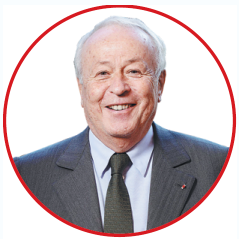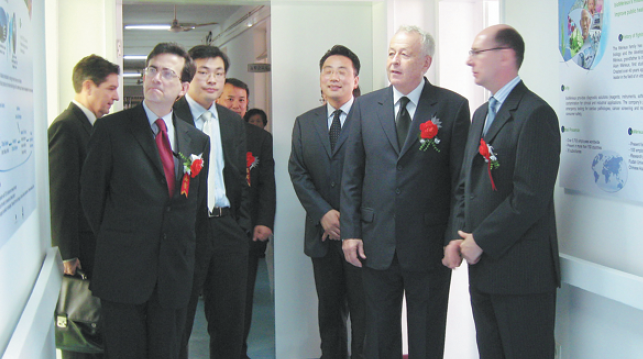
July 10, 1938, in Lyon, France
EDUCATION:
Holds a PhD in pharmacy.
CAREER:
1963: Founded BD Merieux (now known as bioMerieux)
1968-94: President, Institut Merieux
1963-2010: Chairman, bioMerieux
1986-98: Vice-chairman, Rhone-Alpes Regional Council
Standing on front line against pathogens

China's growing excellence in scientific and medical research is playing a major role in the global war on pathogens and infectious diseases, according to Alain Merieux, chairman and CEO of French conglomerate Institut Merieux.
Merieux, whose company was established by his grandfather in Lyon in 1897, has made a massive contribution to improving China's public health over the past 40 years, initially by providing vaccines, and then through medical diagnostics and immunotherapy.
He first visited the country in April 1978, several months before the central government launched its transformative reform and opening-up policy.
Since then, he has spent decades dedicated to cooperation in the health sector, eventually leading to the opening of China's first P4 - photolithographic pattern plated probe - laboratory in 2015.
The lab, which is based in Wuhan, Hubei province, has the highest biosafety standards in the world, allowing researchers to study the most dangerous viruses, including Ebola. The project has become a symbol of Chinese-French collaboration in public health.
"In the health field, which is the one I know best, China has been able to address major issues" over the past 40 years, Merieux said, "providing access to healthcare for everyone in an enormous country; fighting against the major threats represented by emerging pathogens, respiratory diseases and cancer; and preventing food-borne health risks".
He also praised the overall changes seen in the nation.
"China has made exceptional progress that commands respect," he said. "The country has accomplished in 40 years what other countries took a century to do, and has been able to assert itself as a leading global power."
In four decades, "China has rediscovered its pride and strength," Merieux added.
The country has particularly excelled in terms of infrastructure, as the creation of highways, airports and high-speed trains has completely changed the country, he said. There has also been remarkable progress in scientific research, as well as academic, medical and scientific equipment and infrastructure.
Merieux called for greater international cooperation with China to help in the prevention and control of infectious diseases such as tuberculosis, and for the country to contribute more to the whole world.
"This fight must be global, since pathogens cut across borders," he said. "In this fight, we must prioritize international collaborations, and China has a major role to play through the excellence of its scientific and medical teams, and its major research efforts."
The Merieux Foundation, which combats infectious diseases that affect developing countries, is working with the National Health Commission to improve diagnosis and treatment of major infectious diseases in China.
Merieux said his institute has also had positive experiences cooperating on TB eradication programs with authorities in Zhejiang and Heilongjiang provinces and the Xinjiang Uygur and Guangxi Zhuang autonomous regions, and that he hopes to expand the collaboration, particularly to Yunnan province.
In 2014, the businessman was presented with the Friendship Award, the Chinese government's highest honor given to foreigners, for his contribution to disease prevention and control.
Merieux said he is optimistic about China's future, predicting that within 10 years it will be a high-tech society built on major innovations, as well as playing a critical role in countries involved in the Belt and Road Initiative.
The Chinese government has "been able to create gigantic infrastructure in the country, and will continue to do everything they can to make education accessible to all and create effective universities", he said.
"They have been able to fight against the global scourge of corruption, and open up to the rest of the world while remaining committed to their very long-term vision."


